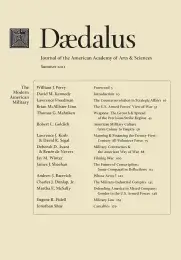Whose Army?
The ideal of civilian control vis-à-vis actual civil-military relations corresponds to the ideal of the common good vis-à-vis actual politics. It represents an aspiration rather than a fact. It will never define reality. A competitive and frequently unseemly relationship between senior U.S. military officers and senior American civilian officials is inevitable. Meanwhile, an unharmonious relationship between the military and society is not inevitable. Here, Americans should view dysfunction as intolerable. Yet since the demise of the tradition of the citizen-soldier, dysfunction in this realm has become endemic and pervasive, contributing to the widespread and misguided militarization of U.S. policy. If Americans are unhappy with the way their army is used, they need to reclaim it. This outcome can arise only by reasserting the connection between citizenship and military service.
As a public policy issue, U.S. civil-military relations suffer from perennial neglect. Given the importance that the United States assigns to maintaining and wielding military power, such neglect is not only surprising but deeply unfortunate.
Civilians and soldiers interact in two distinct domains. On the one hand is the relationship between senior military officers and senior civilian officials. We might call these interactions “elite” or “inside the Beltway” civil-military relations. On the other hand is the relationship between the U.S. armed forces and American society as a whole. These civil-military relations for the rest of us take place, for the most part, beyond the Washington Beltway.
At the elite level, the well-known principle of civilian control, implemented jointly by Congress and the chief executive, is said to exercise a governing influence. Article I, section 8, of the Constitution assigns the legislative branch the power to declare war and to raise, support, and regulate the nation’s armed forces. Article II, section 2, designates the president as commander in chief of federal forces and state troops “when called into the actual Service of the United States.” The president . . .
